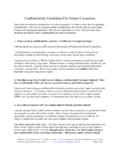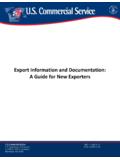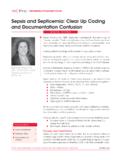Transcription of Tips and Guidelines for Documentation in School …
1 tips and Guidelines for Documentation in School CounselingThere is no way to give one absolute set of Guidelines for Documentation in a School counseling setting. Each district and each School may have its own policies, based on the needs of its students or community. Having said that, here are some things to CONSIDERATIONS: First, check with your supervisor to find out if there is a specific procedure or set of Guidelines alreadyin place. If there is, please use it, but you may also want to consider the following items so you can be asefficient and effective as possible, and so you can be prepared in case legal or ethical dilemmas arise.
2 Unlike social workers and clinical counselors, whose Documentation is considered case notes and maybe read by various people, School counselors often keep anecdotal notes, which are separate from thestudent s permanent record, and kept in folders in each counselor s private filing cabinet. I wouldencourage you to ask your supervisor in advance who has access to your files and who is allowed to seethem upon request. For instance, if a parent asks to see your notes, are you allowed (or required) to grantthat request? Does your administration have the right to access your files? It s important to know thisahead of NOTES: If your records are considered anecdotal notes, then they are your personal property and are not to beshown to anyone, under any circumstances.
3 When I worked in the public schools, I was taught that if Iphysically show my notes to one other person, the notes become public property and can no longer beconsidered confidential, so anyone can see them they could even be printed in the newspaper. Even if Iwas subpoenaed, I was instructed to take my notes with me and read from them in court, but not tovisually show them or turn them over to anyone. If you are keeping anecdotal notes, you may want to consider including a simple, one-page summary ofyour time spent with a particular student, which you could refer to, or even make copies of, if a parent oryour administrator requested the information.
4 A sample of a summary like this is included later in TO GET MORE DETAILED: If you are keeping anecdotal records, there are certain situations where you will want to take moredetailed notes, usually on a separate page from your basic summary. These are typically the times whenstudent safety is in question, or there may be legal involvement, and you are required to notify parents,administration, the School nurse, the police, or CPS about something a student has told you. Thesesituations will most often include the following: Any question of a student s safety being at risk Self-harm (such as cutting, eating disorders, etc.)
5 Or suicide attempt or plan Threats of violence or harm to others, particularly at School 2009 by Susan Hansen, All rights reserved. You are welcome to copy and share this article with all copyright information intact. Page 2 of 8 Drugs or weapons on campus; some off-campus drug use Abuse or suspected abuse Suspected or confirmed pregnancy Sexual activity between minors and adults (even with consent) Harassment, bullying, or discrimination Cheating, stealing, etc., particularly at School Custody battles (because of potential legal involvement) Angry or volatile parents in most any situation Any other situation you feel uneasy about better safe than sorry!
6 WHICH DETAILS TO INCLUDE:When you do need to get more detailed, here are some things to include in your Documentation : The time and date that you spoke with the student Exactly what the student said, in quotes, without paraphrasing or editorializing Interventions that you did with the student at the time (processes you walked them through, worksheets you had them fill out, etc.) Recommendations or suggestions that you made to the student Follow-up calls or conversations you had with anyone else (parents, administrators, police, CPS, etc.) including time and date, who you spoke with, and the content of those conversations, also specifically quoting rather than paraphrasing what the other parties said when it seems significant Any recommendations, referrals or community resources you offered to the parents Any other details you want to have in writing for future reference DOCUMENTING ON THE COMPUTER.
7 If you are keeping your anecdotal records on a computer that is owned by the School , which is the casein some districts, please keep in mind that even if your records are considered confidential, they are stillpart of a bigger network and may be accessed by others. If you want more privacy than that, you maychoose at certain times to hand write your notes and keep them in a locked filing cabinet. Some districts are requiring counselors to do all of their Documentation on the School s shared computersystem, where it can be seen by other counselors, administration, and anyone with access to this system. While I believe this is a huge violation of ethics and confidentiality, it is the policy in some schools.
8 Ifyour School requires this, I strongly encourage you to keep that Documentation very general and minimal,and keep more detailed notes in student files, in a locked filing cabinet in your office. Ethically,informing students and parents about this computerized Documentation system is important they have aright to know in advance who will have access to their records. Documentation AT DIFFERENT GRADE LEVELS: If you are a high School guidance counselor, you may not be required to keep track of every student yousee, or those records may be kept on sign-up sheets in the reception area of the guidance department.
9 If 2009 by Susan Hansen, All rights reserved. You are welcome to copy and share this article with all copyright information intact. Page 3 of 8that is the case, the only time you will need to document specific information is when you have anexception to your regular confidentiality Guidelines in other words, if you need to notify parents,administration, or the School nurse about something, or make a CPS or police report. If you are a School counselor anywhere in the K-8 grade levels, you may be required to keepdocumentation of every student you see, as well as more specific and detailed notes in situations wheresafety or legality is a concern.
10 Again, check with your supervisor in advance to see what is OPTIONS: If you are required to keep basic Documentation of every student you see, whether for statisticalpurposes or accountability, one of the easiest ways to do this is to use a daily planner or calendar and justwrite in the names of the students you see each day, along with your other daily information. If you need to keep track of other basic information such as how many students you see from each grade level, or onwhat subjects, you could make notations on your calendar such as:Sarah Jones, 6 gr., gossipthZach Garcia, 8 gr., schedulingthEmily Miller, 4 gr.








